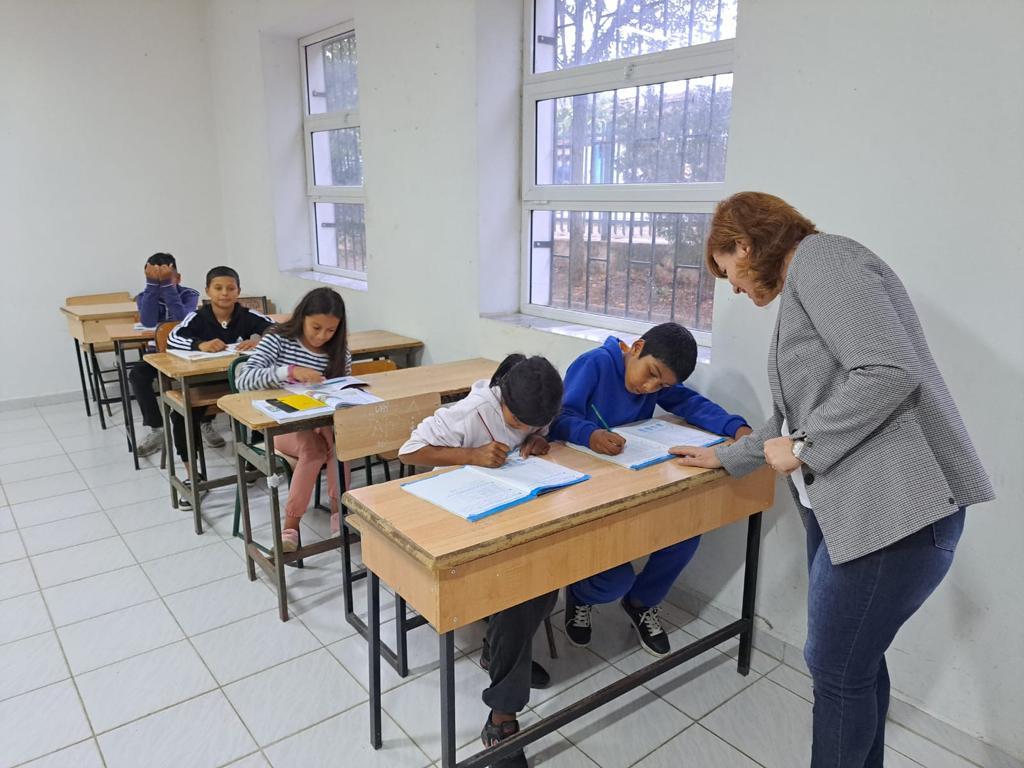UNDP and the European Union work together to support socio-economic integration of returnees in the Western Balkans.
Ensuring dignity for returnees in Albania
October 18, 2022

A few years ago, Mario, a 24-year-old immigrant, returned to Albania. After spending several months working in a car painting and repair shop, his ambition of starting his own auto repair business began to materialize.
Mario submitted an application for a "Start-Up" grant with his business idea along with 155 other applicants. Due to his original thought and workable approach, he was one of the winners. He was given access to a package of support that included individualized coaching and mentoring from qualified professionals. The package also includes USD 5,000 in cash assistance. The seed money will be provided in the form of merchandise.
The government-financed Start-Up program will also be sponsored for all chosen start-ups, including Mario's.
Mario’s family is receiving assistance in acquiring agricultural land titles. This year, they will cultivate wheat. In addition to income from the sale of wheat, Mario's family also anticipates financial gain.
Mario and other vulnerable communities face serious risks. A life in dignity is rendered impossible by poverty and exclusion. They have few formal ways to protect themselves from those risks as the informality remains stubbornly high.
The official statistics indicate that 43,4% of the Albanian population in 2020 was at risk of poverty or social exclusion (AROPE), disproportionately affecting specific segments of society. Access to social assistance and to economic inclusion and labor programs remains limited.
The impact of COVID 19 is still trickling down and affecting all segments of society, but statistical evidence singles out migrants among the hardest hit groups alongside informal and seasonal workers. Returnees often remain invisible for the social safety nets or Governments' relief and recovery packages.
Even though various facets of migration and the reintegration of returnees are addressed in national strategic and policy frameworks, their implementation has been hampered by ineffective mechanisms for horizontal (inter-institutional) and vertical (central-local level) coordination, weakened institutional capabilities, and limited resources.
Mario and other returnees report unequal social and economic hardship as the primary cause of irregular migration and asylum applications by men and women from the Roma and Egyptian minorities.
All demographic groups are affected by irregular migration, but men and women of the Roma and Egyptian descent make up a sizeable portion of this population.
The World Bank and UNDP conducted quantitative and qualitative surveys in 2017 that highlight unequal social and economic hardship as the primary cause of irregular migration and asylum applications by men and women from the Roma and Egyptian communities, with the Roma and Egyptian women being particularly vulnerable.
“Strengthening national and local systems to support the efficient socio-economic integration of returnees in the Western Balkans” is a a regional EU-funded project that UNDP Albania and the EU Delegation have been working on since 2021.
In the context of this initiative, "Dignity for All in Practice" translates into tangible local interventions:
- Local returnee integration action plans are created in collaboration with the municipalities of Fier, Devoll, and Berat with the goal of enhancing the livelihoods and social wellbeing of returnees and the larger community. These plans also address local governance issues, institutional bottlenecks, service provider gaps, and capacity issues that prevent the effective implementation of reintegration policies.
- The implementation of local returnee integration strategies' components, such as creative livelihood and skill-building initiatives, aims to show off fresh perspectives on economic empowerment and social cohesion, which will serve as the cornerstones of local reintegration strategies.
- By creating and using several digitalized tools and laying the groundwork for the introduction of integrated case management, a significant number of urgent administrative issues faced by returnees are addressed. These issues are also being identified and developed while innovative approaches to public service provision are being identified and are in the making.
The IPA II Multi-Country Action Programme, entrusted to UNDP, the WB, and the CoE, aims to support the fundamental rights of the Roma community and other vulnerable returnees in Albania, North Macedonia, and Serbia. It also aims to strengthen national and local systems to support the effective socio-economic integration of returnees in the Western Balkans.
While the countries of the Western Balkans were designated as "safe countries of origin," the project is being implemented to address the reintegration of the sizable number of people who have returned from the EU in recent years.
Albania, North Macedonia, and Serbia were three of the top 20 nations in 2017 in terms of the proportion of citizens with unregulated residency status in the EU.
Some of the primary causes of outward migration include a lack of employment opportunities, low wages, a sizable informal sector, and poor-quality health and educational services as a result of neglect and underinvestment in social infrastructure.
In this regard, the project strengthens the capacity of the Western Balkan governments to put into practice comprehensive approaches to the economic and social empowerment of returnees.
The project aids in the implementation of the larger social inclusion agenda in the Western Balkans by addressing the underlying causes and debilitating factors that drive migration of Roma and vulnerable populations.
While UNDP focuses primarily on local level issues, the project's ultimate goal is to translate the tested models into national regulation and public policies and programs for sustainable reintegration of vulnerable returnees.
This project is being carried out in the Albanian municipalities of Fieri, Devolli, and Berat. Upon completion many people like Mario will have benefitted from a tailored support.

 Locations
Locations